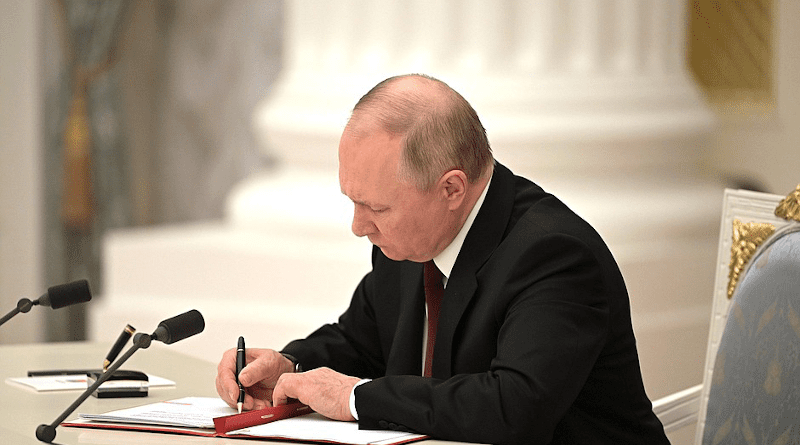What Russia Desires – OpEd
No one appears to have been 100% correct in predicting the manner of Russia’s “special military operation” in Ukraine. Who predicted that Russia would first recognize Donbass’ independence, followed by Russian military action, at the request of the rebel Donetsk and Lugansk governments?
It’s reasonable to surmise that big powers have informal strategy sessions on how to act under hypothetical circumstances. In the weeks leading up to Russia’s military action, the Russian government emphasized the desire for the Kiev regime to finally start implementing the UN approved Minsk Protocol, calling for a negotiated Donbass autonomy in Ukraine. The Russian government also reiterated its call for a new security arrangement with the West.
This Russian diplomatic activity didn’t lead to a substantively positive response. Putin apparently calculated that the NATOization of Ukraine was expanding to the point that it needed to get nipped in the bud sooner rather than later.
The Western establishment’s moral hypocrisy on what happened thereafter notes the generally accepted rationale used for the atomic option on Hiroshima and Nagasaki to end WW II. In more recent times, there’s the disproportionate use of military force that has been utilized by the US and some non-Russian others.
The human suffering in these instances haven’t received anywhere near the same level of on the ground coverage when compared to the current situation in Ukraine. Some of this reporting might very well include misrepresentation, influenced by the possible distortion of pro-Kiev regime proponents.
The blame game points from a mainstream Russian perspective:
- Kiev regime carnage in Donbass (killing thousands and displacing hundreds of thousands)
- Kiev regime interacting with Neo-Nazis
- seven-year Kiev regime stonewalling of the UN approved Minsk Protocol, calling for a negotiated Donbass autonomy
- the specter of NATO expansion in Ukraine compromising the security of Russia- leading up to the Russian military action in Ukraine, Western governments didn’t sanction or threaten to sanction the Kiev regime, much unlike the hypocritical stance towards Russia.
As detailed in my February 27 Antiwar.com piece, there’re no distortions in the above highlighted. I’ve proposed the following for ending the conflict:
- Ukraine formally becomes neutral, with a limited military capability and gets back all of Donbass as a loose affiliate, while recognizing Crimea as a part of Russia. Along with the rest of the former Ukrainian SSR (minus Crimea, which has seen vast improvement since reunifying with Russia), Donbass is given an economic sweetener to go along with this arrangement.
- Quite possibly, a similar scenario can be reached with Georgia. Given an economic sweetener, Abkhazia and South Ossetia become very loosely affiliated with an economically sweetened Georgia, in exchange for a neutral Georgia.
- Georgia and Ukraine can join the EU, while being barred NATO membership, in accordance with international agreements, noting that the expansion of one military alliance shouldn’t sacrifice the security of another country.
- In turn, the hypocritically warped sanctions against Russia (influenced by Western governments) end (including the blatantly bigoted ones in sports and culture), preferably with cooler Western establishment heads acknowledging the arrogantly, ignorant, hypocritical and in some instances bigoted stances taken against Russians.
- NATO and Russia further discuss their differences.
If implemented, this plan serves to improve the global economy.
Along the way, Russia improves at Western English language PR and media. Moscow can start by reviewing some of the people they’ve utilized from the West over others. Making the same mistakes are counterproductive.
Michael Averko is a New York based independent foreign policy analyst and media critic.


Can’t find anything to disagree with here.
But do you really think Russia would accept Ukrainian EU membership,
with a promise of no Ukrainian NATO membership?
:>)
Leonard J. Lehrman
Why not? The chance of Ukraine getting full EU membership anytime soon, if ever doesn’t appear likely.
BTW, Turkey to my knowledge is ahead of Ukraine in consideration for EU membership.
Who knows, at some point Ukraine and/or Turkey might consider the Russian involved Eurasian Economic Union.
So, Are you a Russian apologist? I read your article on the west getting Putin’s intentions wrong, right after Putin wrote his little essay in July 2021 http://en.kremlin.ru/events/president/news/66181 when you said, “Post-Soviet Russia has formally recognized Ukraine as an independent entity. It’s unrealistic to expect Russia to ditch the pro-Russian element among Ukrainians.” https://www.eurasiareview.com/19072021-getting-putins-intentions-wrong-again-on-russia-ukraine-oped/
Boy you sure got that one wrong didn’t you…
The day I read PUtin’s letter, I KNEW Russia was going to invade, no question…
And your opening salvo stating… “Consider the suggestion that Crimea’s reunification with Russia led to increased tensions with the West – omitting what transpired beforehand, with the overthrow of Ukraine’s democratically elected president…” You have got to be kidding… He was engaged in consolidating his power so he wouldn’t have to give it up…kind of like Lukashenko… both following the “Putin/Oligarch” path Putin had provided to them and continued to help on…
Oh wait, Lukashenko was democratically elected wasn’t he? Is he going to give up power voluntarily in an election? Yanukovych was like a carbon copy of Lukashenko except he wasn’t able to hold onto the levers of power as well as Lukashenko… You and I both know the history…
About the only thing I agree with you on is that Crimea or at least Sevastopol (and some territory) is going to have to stay Russian. Russia is NOT going to give it up as it is a critical geopolitical cornerstone of Russian power… So, they will need to give that up… Knowing that history, there is NO WAY Russia is giving it up. I know Crimea’s history quite well also. See we agree on something…